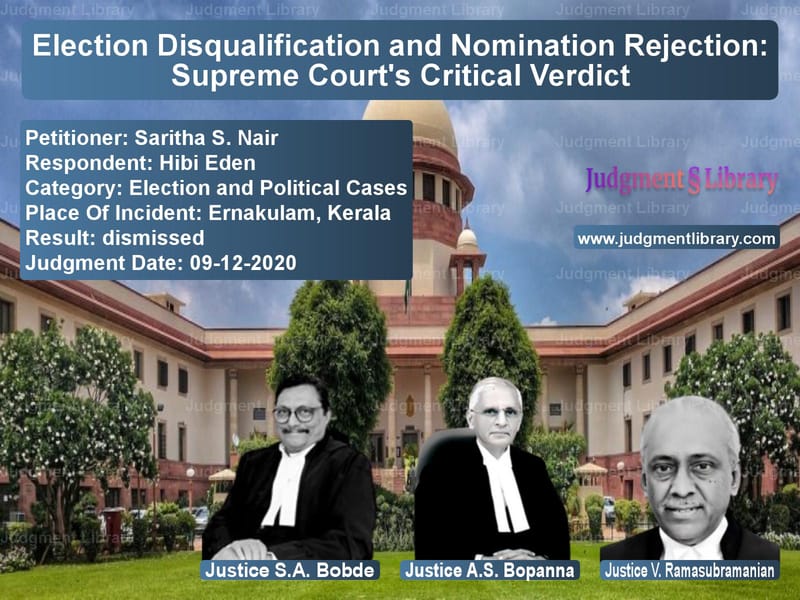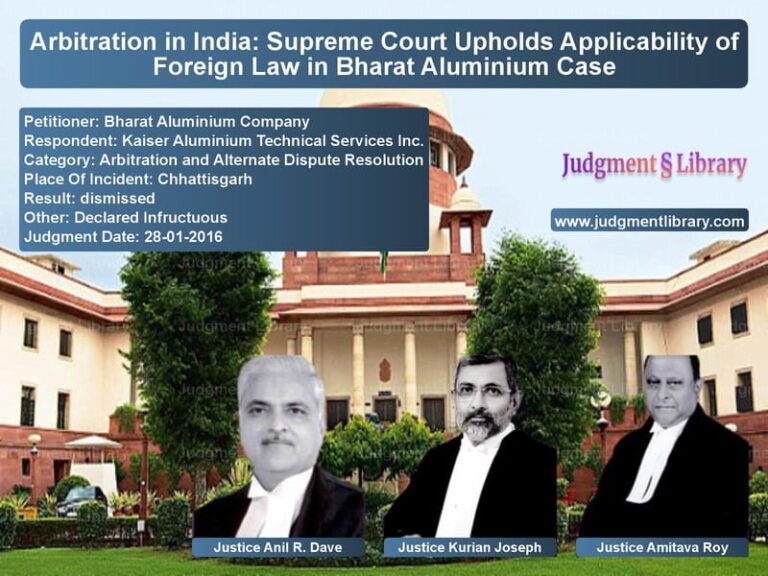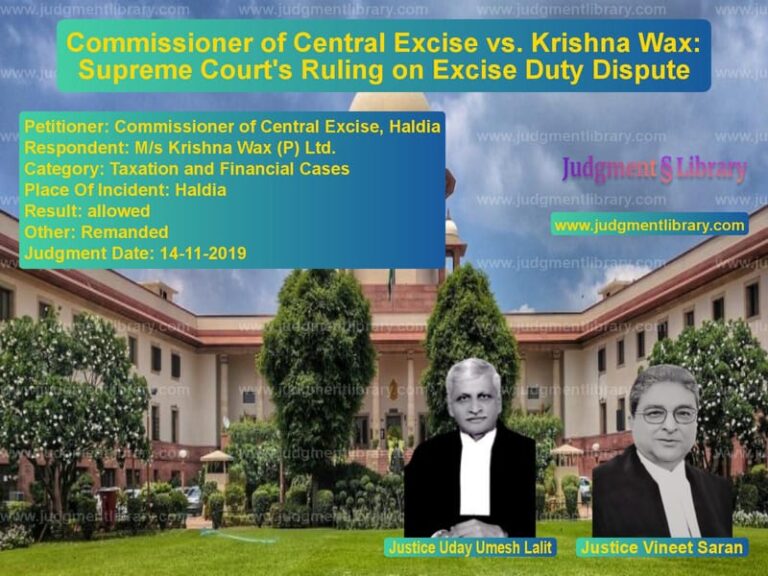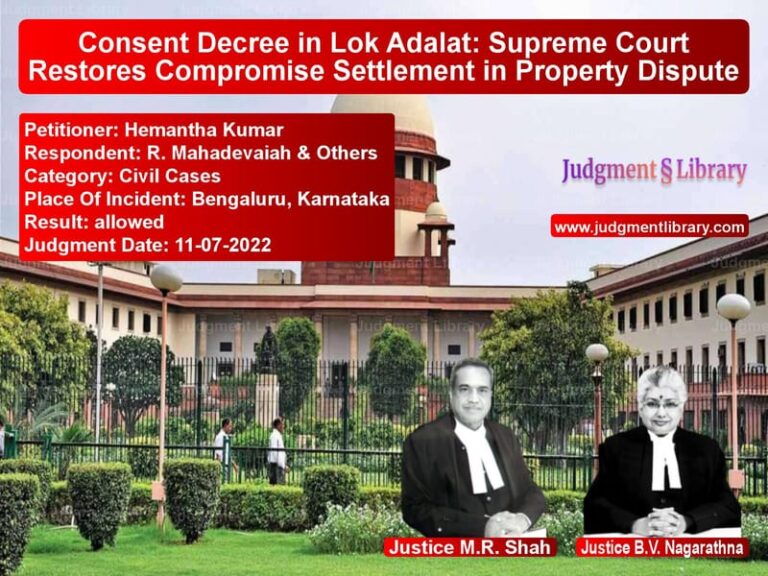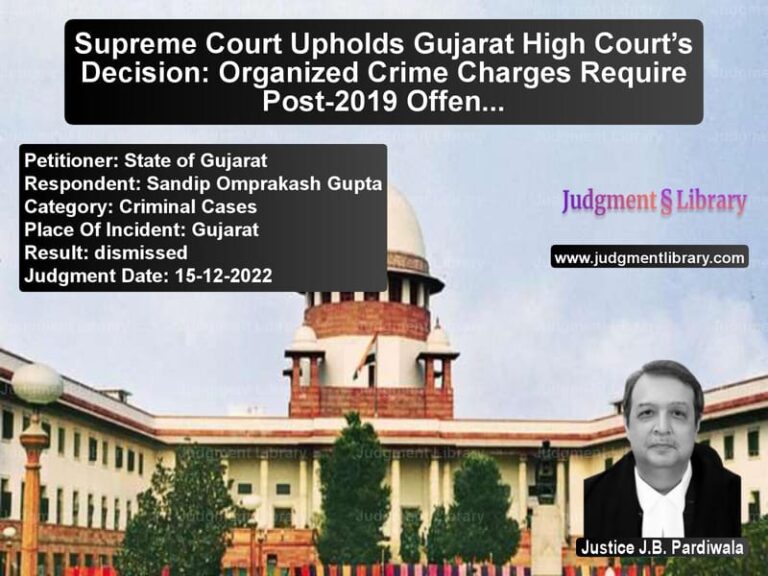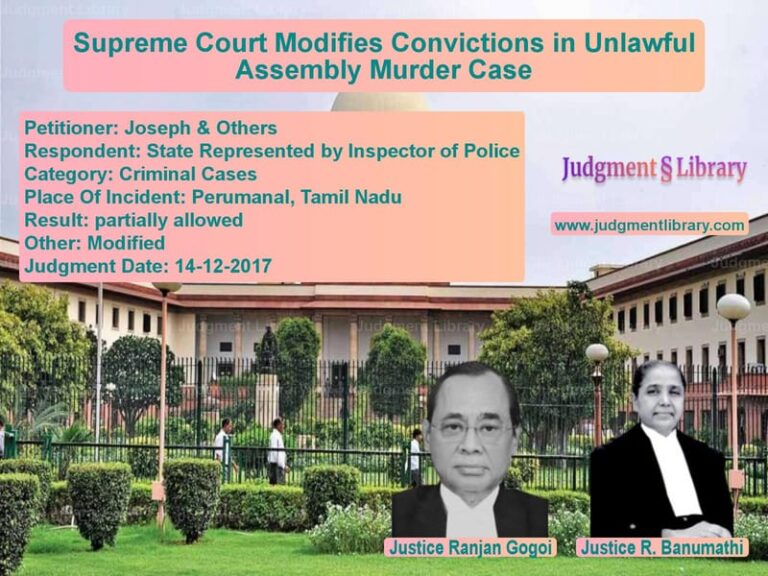Election Disqualification and Nomination Rejection: Supreme Court’s Critical Verdict
The case of Saritha S. Nair vs. Hibi Eden revolved around the rejection of the petitioner’s nomination for the Lok Sabha elections due to her prior criminal convictions. This case raises significant legal questions regarding election eligibility, disqualification criteria, and procedural fairness.
In the 2019 Lok Sabha elections, Saritha S. Nair filed her nomination as an independent candidate from the Ernakulam Constituency in Kerala. However, her nomination was rejected on 6th April 2019 due to two prior criminal convictions that resulted in three-year prison sentences in separate cases. Despite her appeal, the decision was upheld, leading to an election petition that was ultimately dismissed by the High Court of Kerala. The Supreme Court was then approached to decide on the legality of the nomination rejection and the procedural flaws in the election petition.
Key Facts of the Case
- Saritha S. Nair had been convicted in two separate criminal cases (CC No.1300/2013 and CC No.102/2014), each resulting in three-year imprisonment and fines.
- Her appeal in both cases led to a stay of the execution of her sentence but not the conviction itself.
- The Returning Officer disqualified her under Section 8(3) of the Representation of the People Act, 1951, which prohibits candidates sentenced to two or more years from contesting elections.
- Despite disclosing her conviction in her nomination papers, her nomination was rejected in Ernakulam but accepted in Amethi, raising questions about consistency in the election process.
- After her nomination rejection, she filed an election petition challenging the decision, which was dismissed by the High Court due to procedural defects.
- The Supreme Court was then approached to determine the correctness of the rejection and the maintainability of the election petition.
Petitioner’s Argument
Saritha S. Nair’s primary contentions were:
- Since her sentence had been stayed by the appellate court, she should not have been disqualified under Section 8(3) of the Representation of the People Act, 1951.
- The inconsistency in rejecting her nomination in Ernakulam while accepting it in Amethi demonstrated arbitrariness in the election process.
- The rejection of her nomination materially altered the outcome of the election since it prevented her from contesting.
- The defects cited in her election petition, such as improper verification and incomplete prayer, were curable and should not have resulted in outright dismissal.
Respondent’s Argument
The respondent, Hibi Eden, countered the petitioner’s claims by arguing:
- Section 8(3) explicitly states that a candidate is disqualified from the date of conviction, irrespective of any stay on the sentence.
- A suspension of sentence does not equate to a suspension of conviction, which is required to nullify the disqualification.
- Her nomination was rightfully rejected since the disqualification period had not lapsed.
- The procedural defects in the election petition, including the lack of proper verification and an incomplete prayer, were serious enough to warrant dismissal.
Supreme Court’s Analysis
The Supreme Court, in its judgment delivered by Chief Justice S.A. Bobde, along with Justices A.S. Bopanna and V. Ramasubramanian, addressed two key issues:
1. Procedural Defects in the Election Petition
The Court examined whether the High Court was correct in dismissing the election petition due to procedural defects. It ruled that:
- Defects such as improper verification and incomplete prayer were curable and should not have led to outright dismissal.
- The High Court should have provided the petitioner with an opportunity to rectify the defects before dismissing the petition.
- Despite procedural flaws, the substantive legal issues in the case deserved examination.
2. Validity of the Disqualification
The Court reaffirmed that:
- The law clearly states that disqualification applies from the date of conviction, regardless of a stay on the sentence.
- Only a stay on conviction, not just the sentence, can nullify disqualification.
- The petitioner failed to obtain a stay on her conviction and was, therefore, correctly disqualified under Section 8(3) of the Representation of the People Act, 1951.
- Just because the Amethi Returning Officer erroneously accepted her nomination did not create an enforceable precedent for the Ernakulam case.
Key Observations by the Supreme Court
The Supreme Court, referring to past precedents such as B.R. Kapur vs. State of Tamil Nadu and Lily Thomas vs. Union of India, emphasized:
“Disqualification under Section 8(3) of the Act is the consequence of conviction, and a consequence can never precede its cause.”
Additionally, it ruled that:
- The suspension of sentence under Section 389 of the CrPC does not override disqualification.
- The Constitution does not provide relief for candidates disqualified before elections, unlike sitting legislators who can seek protection under Section 8(4) (which was struck down in Lily Thomas).
- The argument that an inconsistent decision in Amethi justified relief in Ernakulam was legally unsound.
Final Judgment
The Supreme Court ruled:
- The election petition should not have been dismissed outright and should have been allowed rectification of procedural defects.
- However, on substantive grounds, the rejection of the petitioner’s nomination was valid under Section 8(3) of the Representation of the People Act, 1951.
- The petitioner was disqualified due to her conviction, and merely staying the sentence was insufficient to restore eligibility.
- The appeal was dismissed.
The ruling reaffirmed the importance of legal clarity in election eligibility criteria, ensuring that candidates convicted of serious offenses remain disqualified unless their conviction itself is stayed. It also highlighted the need for procedural fairness in handling election petitions while upholding the sanctity of electoral laws.
Petitioner Name: Saritha S. Nair.Respondent Name: Hibi Eden.Judgment By: Justice S.A. Bobde, Justice A.S. Bopanna, Justice V. Ramasubramanian.Place Of Incident: Ernakulam, Kerala.Judgment Date: 09-12-2020.
Don’t miss out on the full details! Download the complete judgment in PDF format below and gain valuable insights instantly!
Download Judgment: Saritha S. Nair vs Hibi Eden Supreme Court of India Judgment Dated 09-12-2020.pdf
Direct Downlaod Judgment: Direct downlaod this Judgment
See all petitions in Legislative Powers
See all petitions in Public Interest Litigation
See all petitions in Constitution Interpretation
See all petitions in Judgment by S. A. Bobde
See all petitions in Judgment by A. S. Bopanna
See all petitions in Judgment by V. Ramasubramanian
See all petitions in dismissed
See all petitions in supreme court of India judgments December 2020
See all petitions in 2020 judgments
See all posts in Election and Political Cases Category
See all allowed petitions in Election and Political Cases Category
See all Dismissed petitions in Election and Political Cases Category
See all partially allowed petitions in Election and Political Cases Category

